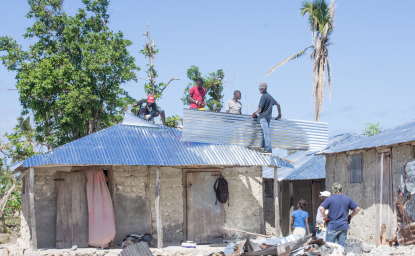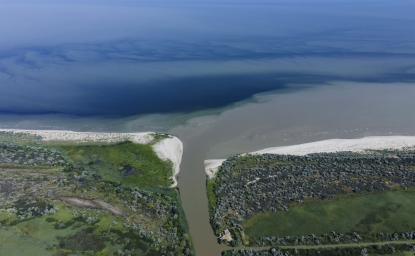From this summer's heat waves to the movie An Inconvenient Truth, climate change has captured our attention. Yet the media's coverage of this hot topic often does not reflect what most scientists agree upon: climate change is happening and humans are participants.
Since 2003, a group of eminent scientists and media leaders have participated in a series of workshops to hone their knowledge in their respective professions and improve coverage of climate science. Some of the participants spoke at the Wilson Center in July about the roles of the media and the science community in relaying information to the public. The Environmental Change and Security Program sponsored this daylong event to review issues raised at the workshops.
Anthony Socci, senior science and communications fellow at the American Meteorological Society and an organizer of the workshop series said, "This discussion is not just germane to reporting of climate science, but science in general, and maybe reporting in general."
When Scandal Leads, Science Recedes
Over the years, environmental issues have captured the media's attention, noted Peter Dykstra, executive producer at CNN, citing the 1986 Chernobyl meltdown, the 1988 summer heat wave, and the 1989 Exxon Valdez oil spill. More recently, the Indonesian tsunami of 2004 and Hurricane Katrina catapulted the environment onto the front page. Dykstra noted the disaster element of these stories earned each lead-story status, while climate change has yet to reach such heights. "There is still a belief that climate change has not happened yet, so climate change will always lose out to more in-your-face news."
New York Times Reporter Andrew Revkin attributed the media's insufficient coverage of climate science partly to the definition of news, which traditionally comprises the day's events. Climate change is much broader and loses out to simpler, shorter-term stories. "The reason a story that is nuanced, that involves uncertainty, that is multidisciplinary, that is a future-oriented story, [does not] get into a paper readily is because you're competing with [hot-button topics]," Revkin said. "A story on climate change is [not] going to win the day."
The panelists also underscored the quality of coverage. Naomi Oreskes, associate professor at the University of California at San Diego, said, "There was an enormous disconnect between what the scientists were saying—that the basic reality [of climate change] was not in dispute—versus the way it was being presented in the mass media, as if the basic causality was up for grabs."
Causality of climate change has not been contested for some time, according to the participants. Ben Santer, physicist and atmospheric scientist at the Lawrence Livermore National Laboratory, highlighted the progress of the Inter-Governmental Panel on Climate Change (IPCC), which, in 1990, concluded it would take more than a decade to determine the human-induced alterations to the global climate.
Nevertheless, only six years later, the IPCC stated, "the balance of evidence suggests a discernible human influence on the global climate."
By January 2001, the IPCC made a stronger statement: "There is new and stronger evidence that most of the warming observed over the last 50 years is attributable to human activities." Santer expects the 2007 IPCC assessment to continue on this trajectory, given the compelling evidence of global warming.
Most of the scientific community does not dispute the existence of climate change, but such stories usually read like political news, in which "dueling experts" are given equal space to debate it. Oreskes countered giving voice to the few scientists who contest climate change. "Rather than looking for dissent, [reporters should] find out what is the consensus within the [scientific] community. In climate change, the consensus is that it is real and that humans are having an impact."
Speaking the Language of Science
Part of the problem with climate change coverage, or lack thereof, is poor communication between scientists and journalists, said Jerry Mahlman, senior research associate at the National Center for Atmospheric Research. Reporters seek brief quotes that synthesize complex information and Mahlman noted this is difficult for scientists. "My job is to educate the world about climate warming, its cause, and what the global scale implications are—and that is very difficult to stuff into a soundbite."
Scientists may not be great communicators, but poor news coverage and the tendency to fall back on scandal also reflect educational weaknesses within newsrooms, said Richard Somerville, distinguished professor at the Scripps Institution of Oceanography. "More salacious and scandalous stories related to science are covered, rather than scientific discovery, which certainly takes more knowledge to report on."
Many panelists lamented the lack of science beats in newsrooms around the country as well as the largely American fear of all things science. Editors present another barrier. Bud Ward, founder of the online journal Environment Writer and one of the organizers of the workshop series, explained that editors act as information "gatekeepers," but many of them know little about science and, therefore, science stories often are relegated to the back page, reported poorly, or excluded completely.
Reporters frequently mistake the link between weather and climate. "News organizations latch on to these major weather events but don't understand the distinction between weather and climate," said Bruce Lieberman, a science writer at The San Diego Union Tribune. But he said unusual weather such as the recent national heat wave offers "teachable moments" for reporters to place local events in a larger context.
Creating the New Science Story
The media tend to overlook stories on climate change beyond the environmental desk. Panelists cited potential stories for the business, technology, and political beats. "So often in reporting
you'll hear discussions on what to do about [climate change] cast in terms of ‘regulate emissions of greenhouse gases or preserve millions of American jobs,' as if these things were mutually exclusive," but they are not, said Santer, adding the issue affords major economic opportunities. "There are enlightened companies out there, like BP and Shell, that are spending millions of dollars investing in alternative energy," for example, he said.
To improve media coverage of climate science, Anthony Broccoli, associate professor at Rutgers University, proposed journalists establish a relationship with a scientist they trust as a neutral broker of information.
"[The study of climate science] is everything: it is glaciology, it is physics, it's atmospheric chemistry, it's oceanography, it is biology, and on and on," Revkin said. But outcomes remain unknown. In Greenland, for example, it's unknown whether the land mass's melting zones would help cool itself off and prevent more melting, or whether melting would continue more rapidly. Revkin said. "There is no one who can speak with authority about how [Greenland] is going to play out."
In fostering scientist-journalist connections, scientists must feel comfortable enough to speak on the record. Jim Detjen, director of the Knight Center for Environmental Journalism at Michigan State University, said many universities discourage scientists from speaking to the media. "A big issue to me is that until people at universities, scientists, get tenure they're very much afraid to speak out," he said.
Climate change requires dramatic changes across the planet, and the media and scientists must overcome their cultural differences to educate the public and prepare for the future. Panelists agreed the time for debate has passed; it is time for action.
Somerville said, "The molecule of carbon dioxide that came out of your tailpipe yesterday will be in the atmosphere for 100 years, which is plenty of time for the wind to equalize it, so the CO2 concentration anywhere on Earth is a result of what all 6 billion of us have done, and it's not going to be solvable unless all 6 billion of us are on the same page."
Click Here for further information, including event video and additional links.
By Alison Williams and Marybeth Redheffer




